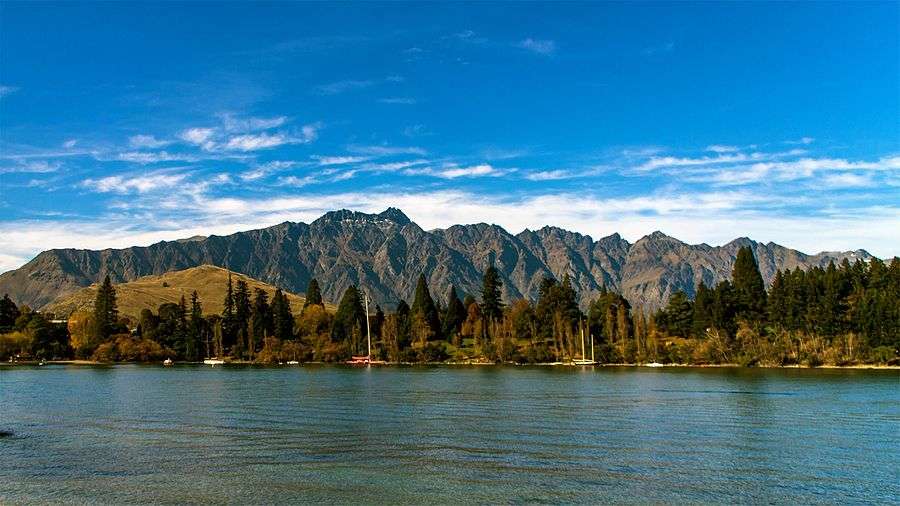Queenstown, New Zealand
| Queenstown Tāhuna (Māori) | |
|---|---|
| Resort town | |
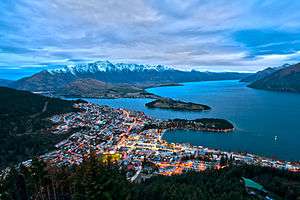 Queenstown from Bob's Peak | |
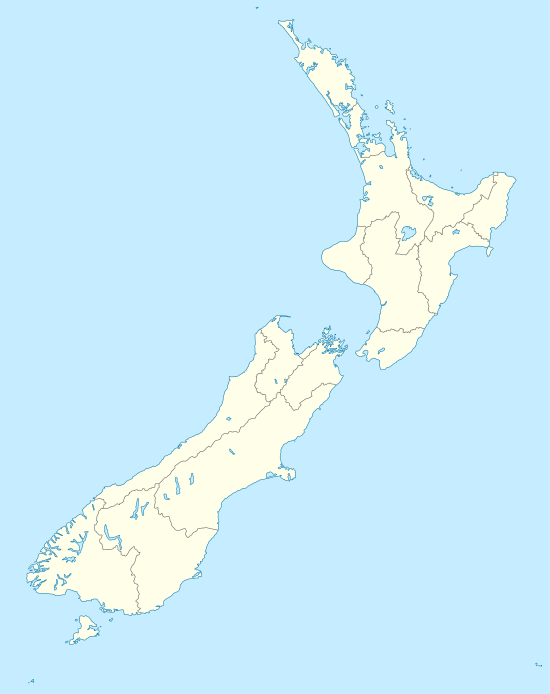 Queenstown | |
| Coordinates: 45°01′52″S 168°39′45″E / 45.03111°S 168.66250°ECoordinates: 45°01′52″S 168°39′45″E / 45.03111°S 168.66250°E | |
| Country |
|
| Region |
|
| Territorial authority | Queenstown-Lakes District |
| Named | January 1863 [1] |
| Founded by | William Gilbert Rees |
| Government | |
| • Mayor | Jim Boult |
| Area | |
| • Urban | 25.55 km2 (9.86 sq mi) |
| • District | 8,704.97 km2 (3,361.01 sq mi) |
| Population (June 2017) | |
| • Urban | 15,300 |
| • Urban density | 600/km2 (1,600/sq mi) |
| • District | 37,100 |
| • District density | 4.3/km2 (11/sq mi) |
| Time zone | UTC+12:00 (NZST) |
| • Summer (DST) | UTC+13:00 (NZDT) |
| Postcode(s) | 9300 |
| Area code(s) | 03 |
| Local iwi | Ngāi Tahu |
Queenstown (Māori: Tāhuna)[2] is a resort town in Otago in the south-west of New Zealand's South Island. It has an urban population of 15,300 (June 2017),[3] making it the 27th largest urban area in New Zealand. In 2016, Queenstown overtook Oamaru to become the second largest urban area in Otago, behind Dunedin.
The town is built around an inlet called Queenstown Bay on Lake Wakatipu, a long thin Z-shaped lake formed by glacial processes, and has views of nearby mountains such as The Remarkables, Cecil Peak, Walter Peak and just above the town, Ben Lomond and Queenstown Hill.
The Queenstown-Lakes District has a land area of 8,704.97 square kilometres (3,361.01 sq mi) not counting its inland lakes (Lake Hāwea, Lake Wakatipu, and Lake Wanaka). The region has an estimated resident population of 37,100 (June 2017).[3] Neighbouring towns include Arrowtown, Glenorchy, Kingston, Wanaka, Alexandra, and Cromwell. The nearest cities are Dunedin and Invercargill. Queenstown is known for its commerce-oriented tourism, especially adventure and ski tourism.
History
Māori settlement and presence
The area was discovered and first settled by Māori before non-Māori arrived. The first non-Māori to see Lake Wakatipu was European Nathanael Chalmers who was guided by Reko, the chief of the Tuturau, over the Waimea Plains and up the Mataura River in September 1853.[4] Evidence of stake nets, baskets for catching eels, spears and ashes indicated the Glenorchy area was visited by Māori. It is likely Ngāi Tahu Māori visited Queenstown en route to collect Pounamu (greenstone). A settlement called Te Kirikiri Pa was occupied by the tribe of Kāti Māmoe which was situated where the Queenstown Gardens are today, but by the time European migrants arrived in the 1860s this settlement was no longer being used.[5]
Subsequent European settlers
European explorers William Gilbert Rees and Nicholas von Tunzelmann were the first non-Maoris to settle the area. Rees established a high country farm in the location of Queenstown's current town centre in 1860, but the discovery of gold in the Arrow River in 1862 encouraged Rees to convert his wool shed into a hotel named the Queen's Arms, now known as Eichardt's.[6] Many Queenstown streets bear names from the gold mining era (such as Camp Street) and some historic buildings remain. William's Cottage, the Lake Lodge of Ophir, Queenstown Police Station, and St Peter's Anglican Church lie close together in a designated historic precinct.
Naming
There are various apocryphal accounts of how the town of Queenstown was named however the following is the most likely:
When William Rees first arrived in the area and built his homestead, the area was known as The Station although miners soon referred to it as The Camp from 1860 to 1862.
The miners, and especially the Irish, had taken an interest in the ceremony held for a small town called Cobh in Ireland which was renamed Queenstown in honour of Queen Victoria in 1850.[7] They may have had their own ceremony at the intersection of Rees and Beach Streets replicating some of the elements in the renaming of the Irish town.
Subsequent to this a public meeting was held for the purpose of naming the township on the lake in January 1863 (probably the weekend of the 3rd and 4th) in which the town was officially given the name of Queenstown in reference to Ireland's Queenstown. By 9 and 10 January 1863 the town was being reported with the name of Queenstown from several reports written by a correspondent in the Otago Witness on Monday the 5th and Tuesday the 6th.[8][9] It was during the meeting there may have been a reference by a miner of the town being "fit for a Queen" (this is one of the most popular accounts of how the town was named).
The Māori name for Queenstown of Tāhuna means shallow bay.[5]
Geography
Queenstown is situated on the shore line of Lake Wakatipu, the third largest lake by surface area in New Zealand. It is at a relatively low altitude for a ski and snowboarding centre at 310 metres above sea level on the shores of the lake, but is nestled among mountains. Nearby are gorges plus plains suitable for agriculture.
Suburbs
Central Queenstown contains many businesses, apartments and homes but is near many suburbs or large areas of housing: Fernhill, Sunshine Bay, Queenstown Hill, Goldfield Heights, Marina Heights, Kelvin Heights, Arthurs Point and Frankton. Just outside Queenstown are the areas of: Arrowtown, Closeburn, Dalefield, Gibbston, Jack's Point, Hayes Creek, Lake Hayes Estate, Shotover Country and Quail Rise.
.jpg)
Climate
Because of its relatively moderate altitude (310 metres) and high mountain surroundings, Queenstown has an oceanic climate (Köppen climate classification Cfb).[10] Summer has long warm days with temperatures that can reach 30 °C while winters are cold with temperatures often in single digits with frequent snowfall, although there is no permanent snow cover during the year. As with the rest of Central Otago, Queenstown lies within the rain shadow of the Southern Alps, but being closer to the west coast the town is more susceptible to rain-bearing fronts compared to nearby Cromwell, Wanaka and Alexandra. The hottest recorded temperature in Queenstown is 34.1 °C (93 °F), while the coldest is −8.4 °C (17 °F).[11]
| Climate data for Queenstown (1981–2010) | |||||||||||||
|---|---|---|---|---|---|---|---|---|---|---|---|---|---|
| Month | Jan | Feb | Mar | Apr | May | Jun | Jul | Aug | Sep | Oct | Nov | Dec | Year |
| Average high °C (°F) | 21.8 (71.2) |
21.8 (71.2) |
18.8 (65.8) |
15.0 (59) |
11.7 (53.1) |
8.4 (47.1) |
7.8 (46) |
9.8 (49.6) |
12.9 (55.2) |
15.3 (59.5) |
17.1 (62.8) |
19.7 (67.5) |
15.0 (59) |
| Daily mean °C (°F) | 15.8 (60.4) |
15.6 (60.1) |
13.0 (55.4) |
9.7 (49.5) |
7.0 (44.6) |
4.1 (39.4) |
3.0 (37.4) |
5.0 (41) |
7.7 (45.9) |
9.8 (49.6) |
11.6 (52.9) |
14.0 (57.2) |
9.7 (49.5) |
| Average low °C (°F) | 9.8 (49.6) |
9.4 (48.9) |
7.2 (45) |
4.3 (39.7) |
2.3 (36.1) |
−0.3 (31.5) |
−1.7 (28.9) |
0.2 (32.4) |
2.5 (36.5) |
4.3 (39.7) |
6.0 (42.8) |
8.3 (46.9) |
4.4 (39.9) |
| Average precipitation mm (inches) | 64.7 (2.547) |
50.3 (1.98) |
53.4 (2.102) |
56.2 (2.213) |
68.5 (2.697) |
71.5 (2.815) |
50.3 (1.98) |
66.2 (2.606) |
62.4 (2.457) |
66.4 (2.614) |
63.6 (2.504) |
75.3 (2.965) |
748.9 (29.484) |
| Average precipitation days (≥ 1.0 mm) | 7.2 | 6.2 | 7.4 | 7.4 | 9.0 | 9.2 | 6.9 | 9.1 | 8.5 | 8.8 | 7.6 | 9.6 | 96.9 |
| Average relative humidity (%) | 70.2 | 74.3 | 75.8 | 78.4 | 81.1 | 83.8 | 83.3 | 80.5 | 73.1 | 70.9 | 67.5 | 69.4 | 75.7 |
| Mean monthly sunshine hours | 230.3 | 207.3 | 187.0 | 145.4 | 87.8 | 71.8 | 88.3 | 120.0 | 153.6 | 197.7 | 216.6 | 223.5 | 1,929.2 |
| Source: NIWA Climate Data[12] | |||||||||||||
Economy
Growth and affordability
Residential housing in the Queenstown area is quite expensive due to factors such as the town being a tourist destination, its lack of land and its desirability to foreigners and investors. Queenstown is rated the least affordable place in New Zealand to buy a property, overtaking Auckland at the start of 2017.[13][14] In December 2016 the average house price in the Queenstown area rose to $1 million NZD.[15]
Employment
The area’s growth rate is one of the fastest in the country with the population growing 7.1% from 2015 to 2016 in a 12-month period. Most jobs in Queenstown are tourism- or accommodation-related. Employment growth was also the highest of any area in New Zealand at 10.3% in the March 2016 year.[16]
Tourism
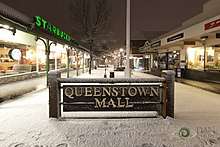
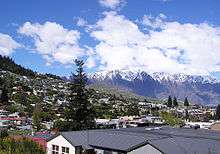
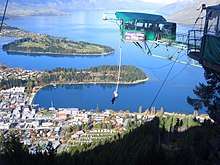
A resort town, Queenstown boasted 220 adventure tourism activities in 2012.[17] Skiing and snowboarding, jet boating, whitewater rafting, bungy jumping, mountain biking,[17] skateboarding, tramping, paragliding, sky diving and fly fishing are all popular.
Queenstown is a major centre for snow sports in New Zealand, with people from all over the country and many parts of the world travelling to ski at the four main mountain ski fields (Cardrona Alpine Resort, Coronet Peak, The Remarkables and Treble Cone). Cross country skiing is also available at the Waiorau Snowfarm,[18] near Cardrona village.
The 100-year-old twin screw coal fired steamer TSS Earnslaw traverses Lake Wakatipu.
Queenstown lies close to the centre of a small wine producing region, reputed to be the world's southernmost.[19][20] The Two Paddocks vineyard is owned by internationally known local actor Sam Neill.[21] Neighbouring, historic Arrowtown features restaurants and bars.
Other tourist activities include:
- Ben Lomond, a nearby mountain for a view of the area
- The Skyline Gondola[22] ascends Bob's Peak on Ben Lomond
- Kiwi Birdlife Park[23] and Paradise for the paradise duck (Tadorna variegata)
- Walk, mountain bike, or run The Queenstown Trail
- Skippers Road[24]
- Scenic flights
Culture
Festivals
Queenstown has many festivals.[25] In 2013, examples include the Bike Festival (March/April),[26] Winter Festival (June),[27] and Jazz Festival (October).[28]
Locations for television and film
Jane Campion's six-part drama mystery Top of the Lake was shot during 2012 for pay TV release in 2013. The lakes of the Wakatipu appear ominous,[29] and the Southern Alps spectacular. The main location is Moke Lake[30][31] and scenes were shot on Lower Beach Street and Coronation Drive, and at a supermarket and bottle store on Shotover Street.[30]
In 2010, Cycle 14 of America's Next Top Model, was, in part filmed in Queenstown and was as won by Krista White. Raina Hein was runner-up.
Queenstown and the surrounding area contain many locations used in the filming of The Lord of the Rings film trilogy. Locations used include Paradise near Glenorchy, at the head of Lake Wakatipu.
Queenstown became popular in South Asia after the release of Bollywood Blockbuster Kaho Naa... Pyaar Hai, which was partially shot there. Starring sensational debuts by Hrithik Roshan & Amisha Patel it was this film that opened the doors for both tourists and filmmakers from India to New Zealand with Queenstown being the most sought after destination. Queenstown featured for 17 minutes in I Hate Luv Storys, a 2010 Bollywood romantic comedy. Queenstown and the surrounding areas were also used in the 2009 X-Men Origins: Wolverine film. Mee-Shee: The Water Giant was shot in Queenstown in 2005, and released to DVD in the same year. Queenstown was also used to film most of the 1988 The Rescue. Queenstown was the base for filming the George Lucas 1988 fantasy film Willow.
Filming of the 1981 film Race for the Yankee Zephyr took place in and around Queenstown, the first major motion picture production for the area.
A 1989 TV Commercial for the Toyota Hilux starring Barry Crump and Lloyd Scott in which the two drive off the cliff was filmed at nearby Queenstown Hill.
The first and last episodes of the fifth season of The Mole were filmed in Queenstown.
The 2017 Filipino drama film Northern Lights was shot entirely on location in Queenstown substituting for the setting of Alaska.[32]
In 2017 the Korean variety show Running Man shot an episode in Queenstown, where Haha and Yang-Se Chan took a penalty at the Nevis Swing.
Sports and recreation
- Queenstown Events Centre and stadium
- Paragliding or Hang Gliding[33]
- Aerobatics[34] with the Wakatipu Aero Club[35] at Queenstown Airport at Frankton
- Golf at Millbrook Resort, Jack's Point,[36] or Queenstown Golf Club[37]
- Disc golf[38][39] at the Queenstown Gardens
- Tennis at the Queenstown Tennis Club[40] in Queenstown Gardens
- Cricket at the Queenstown Cricket Club[41]
- Netball at the Wakatipu Netball Centre[42]
- Rugby league and Rugby union at the Wakatipu Rugby League Club[43][44] Memorial Park
- Touch rugby[45] during the summer season[46]
- Scuba diving or snorkeling in a river, bridge wreck, or in Lake Wakatipu[47]
- Adventure sport, canyon-swing, parachute, jetboat, bungy jump, river-surf, or kitesurf
In the Area
- Central Otago region
- Central Otago wine region
- History of the Central Otago Gold Rush
- Milford Road, Milford Sound / Homer Tunnel, the Fiordland Lakes / Doubtful Sound
- Tramping track near Glenorchy
- Routeburn,[48] one of the New Zealand Great Walks
Transport
Queenstown is accessible by road and air but not by rail (similar to Kaitaia, Taupo and Nelson).
As a resort centre, many bus services operate into Queenstown, mostly for package tours, but daily services for locals and others are available to and from Invercargill, Dunedin and Christchurch, the main cities closest to Queenstown.
Queenstown Airport takes flights from Australia by airlines Air New Zealand, Qantas, Virgin Australia and Jetstar and has destinations that include Brisbane, Gold Coast, Melbourne, and Sydney (the frequency is much increased over the ski season and during summer). Domestic flights fly to Auckland, Christchurch, and Wellington. Queenstown Airport is New Zealand's busiest helicopter base, also the fourth busiest airport by passenger traffic, and is also heavily used for tourist 'flightseeing', especially to Milford Sound and Mount Cook, using both fixed-wing and rotary-wing aircraft.
The primary road access to the Queenstown area is via State Highway 6 (SH6), from Cromwell through the Kawarau Gorge to Frankton, where a 9 km spur (SH6A) leads to the CBD and connects with the Glenorchy Road. SH6 continues south, crossing the Kawarau river before heading down the eastern side of Lake Wakatipu to Kingston before crossing the provincial boundary and emerging on the plains of Southland, terminating in the city of Invercargill. A difficult road over the Crown Range leads to Cardrona skifield and Wanaka, and is New Zealand's highest paved public road pass.[49]
Queenstown is the departure point for a large number of bus day trips to Milford Sound, which entails a return trip of approximately 12 hours. There are scenic flights available to and from Milford Sound. A return flight, including a two-hour cruise, is approximately four hours.
Education
Wakatipu High School is a government co-ed school which services the community for students in years 9–13.[50]
Primary schools catering to students in years 1–8 in the Queenstown area are: KingsView, Queenstown, Remarkables, St Joseph's and Shotover.
Southern Institute of Technology (SIT), based in Invercargill, has a campus in Queenstown.[51]
Queenstown Resort College is a tertiary education provider focussing on tourism. The college actively supports events for international travel agents.[52]
ACE Wakatipu has a community focus, and provides links to many adult training opportunities.[53]
Notable people
- Sam Neill (born 1947), actor, has a home in Queenstown.
- Tim Bevan (born 1957), film producer, was born in Queenstown.
- Jaime Passier-Armstrong (born 1981), actress, was born in Queenstown.
- Jane Taylor, lawyer and current Chair of New Zealand Post, lives in Queenstown.
- Kim Dotcom, internet entrepreneur
Sister cities
See also
Bibliography
- Reed, A. W. (2002). The Reed Dictionary of New Zealand Place Names. Auckland, New Zealand: Reed Books. ISBN 0-7900-0761-4.
References
- ↑ Jardine, D.G. (1978). Shadows on the Hill. A.H. & A.W. Reed Ltd. p. 187. ISBN 0589010093.
- ↑ "Queenstown". Victoria University. Retrieved 2 September 2015.
- 1 2 "Subnational Population Estimates: At 30 June 2017 (provisional)". Statistics New Zealand. 24 October 2017. Retrieved 24 October 2017. For urban areas, "Subnational population estimates (UA, AU), by age and sex, at 30 June 1996, 2001, 2006-16 (2017 boundary)". Statistics New Zealand. 24 October 2017. Retrieved 24 October 2017.
- ↑ Miller., F.W.G., (1949), Golden Days of Lake County. Whitcombe and Tombs. p 3-11.
- 1 2 "Spiritual bond to first people". Otago Daily Times. Retrieved 6 September 2015.
- ↑ "Queenstown history - William Gilbert Rees".
- ↑ "Queenstown". New Zealand History. Retrieved 25 August 2015.
- ↑ "The Dunstan". Otago Witness. Retrieved 24 August 2015.
- ↑ "The Dunstan". Otago Witness. Retrieved 24 August 2015.
- ↑ "Statistics for NZL Queenstown". Department of Energy. 2010. Retrieved 6 June 2011.
- ↑ (from the NIWA website)
- ↑ "Climate Data and Activities". NIWA. Retrieved 19 October 2013.
- ↑ "Residential house values". Quotable Value. Retrieved 16 April 2016.
- ↑ Gibson, Anne. "Central Otago now less affordable than Auckland". newstalkzb.co.nz. Newstalk ZB. Retrieved 14 April 2017.
- ↑ "Queenstown house prices hit $1 million". Newshub. MediaWorks TV. Retrieved 14 April 2017.
- ↑ Mckenzie-McLean, Jo. "Queenstown and Central Otago take top spots in job growth for 2016". stuff.co.nz. Fairfax New Zealand Limited. Retrieved 14 April 2017.
- 1 2 Bennett, Sarah; Slater, Lee (25 April 2012). "Queenstown's cycling explosion". Travel New Zealand. Fairfax. Retrieved 19 March 2013.
- ↑ "Waiorau Snowfarm". Destinations. Australia: Canberra Alpine Club.
- ↑ Lucy Gillmore (19 March 2006). "A tasting trip to the southernmost vineyards in the world". The Independent. Retrieved 29 April 2018.
- ↑ "Central Otago Wineries and Wine Region". Wines of New Zealand. Retrieved 29 April 2018.
- ↑ Cathy Scott. "Two Paddocks: Our Story".
- ↑ Queenstown Skyline Gondola Archived 22 June 2012 at the Wayback Machine.
- ↑ "Kiwi Birdlife Park". Kiwi Birdlife Park.
- ↑ Gardiner, Brooke (14 September 2012). "Slip closes Skippers road for month". Southland Times. Fairfax. Retrieved 19 March 2013.
- ↑ "Queenstown events: Festivals and events in Queenstown, NZ".
- ↑ "Home " Queenstown Bike Festival". Queenstown Bike Festival.
- ↑ "Dates set for 2013 Queenstown Winter Festival". Queenstown Winter Festival.
- ↑ "Queenstown Jazzfest 2014 - 24-26 October - 3 days of Fantastic Music over Labour Day Weekend".
- ↑ Beech, James (8 March 2013). "Setting stars in top drama". Otago Daily Times. Fairfax. Retrieved 19 March 2013.
- 1 2 "Campion shoot is now 'Top of town'". Mountain Scene. Queenstown, New Zealand: Scene. 20 March 2012. Archived from the original on 4 June 2013. Retrieved 19 March 2013.
- ↑ Pulver, Andrew (9 February 2013). "Top of the Lake – first look review". Guardian. Guardian News. Retrieved 19 March 2013.
- ↑ http://www.philstar.com/entertainment/2017/03/06/1678533/yen-santos-love-scene-piolo-pascual-kota-na-ko
- ↑ "SkyTrek - tandem hang gliding & paragliding - Queenstown".
- ↑ Graham Barker. "Aerobatics over Queenstown".
- ↑ "Trial Flight - Ever Dreamed of Flying".
- ↑ "Golf " Jack's Point".
- ↑ "Queenstown Golf Club".
- ↑ "Queenstown Disc Golf".
- ↑ "Disc Golf in Queenstown, New Zealand".
- ↑ "Queenstown Tennis Club".
- ↑ "Queenstown Cricket Club".
- ↑ "Home - Wakatipu Netball, Queenstown New Zealand".
- ↑ Wakatipu Rugby League Club Archived 5 May 2013 at the Wayback Machine.
- ↑ "About Us".
- ↑ "One-touch rugby". Mountain Scene. Queenstown, New Zealand: Scene. 20 October 2011. Retrieved 19 March 2013.
- ↑ "Touch Southland". Invercargill, New Zealand. Retrieved 19 March 2013.
- ↑ "Bathroom Renovation Wellington NZ".
- ↑ "The Routeburn Track".
- ↑ "What is the highest state highway in New Zealand?". New Zealand Transport Agency. Retrieved 27 March 2017.
- ↑ "Wakatipu High School". Retrieved 21 May 2013.
- ↑ Chandler, Philip (5 July 2012). "SIT cuts teacher hours". Mountain Scene. Queenstown, New Zealand: Scene. Retrieved 19 March 2013.
- ↑ Lamont, Sarah (1 March 2012). "Rare window opens for Queenstown". Southland Times. Fairfax. Retrieved 19 March 2013.
- ↑ "Adult Learning Link Wakatipu: Wakatipu Adult Classes".
- ↑ Sister Cities Archived 29 April 2012 at the Wayback Machine.
- ↑ "新西兰皇后镇与杭州"互粉" 杭州"朋友圈"新增3个友好城市 - 杭网原创 - 杭州网".
- ↑ "International Relationships". Queenstown Lakes District. Retrieved 16 March 2016.
External links
![]()
![]()
- Queenstown Lakes District Council
- Queenstown Tourism official site
- Queenstown at Curlie (based on DMOZ)

